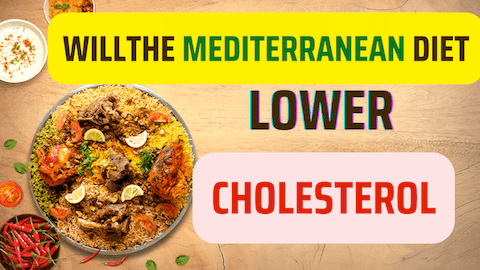Because it can accumulate in your arteries and bring on a heart attack, cholesterol is considered to be unhealthy for the heart.
A number of additional disorders, including stroke, dementia, and kidney disease, have been related to high cholesterol levels.
If your doctor determines that you have high cholesterol, they will almost certainly prescribe statins, which are a class of medication that helps maintain cholesterol levels already within healthy ranges.
However, there are drawbacks associated with the use of these medications.
Will the Mediterranean Diet Lower Cholesterol?
They come with a risk of adverse effects, such as an increased risk of developing type 2 diabetes.
Due to the fact that this medication must be taken continually, frequently for the rest of the patient’s life, there is a financial consequence associated with it.
A significant number of individuals, although relying on medicine to maintain healthy cholesterol levels, continue to consume the kinds of foods that were the root cause of the problem in the first place.
This is a really reckless move.

Instead of relying solely on medication, you should prioritise taking care of your health and taking preventative measures wherever possible.
The second approach that your doctor may take is to recommend that you minimise the quantity of meals that are high in fat that you consume.
Cutting back on butter, baked goods, fatty meats, and biscuits and cake can all contribute in their own way to lowering cholesterol levels.

However, our bodies need fat. Our brains are 60% fat.
The heart is protected by a layer of fat that surrounds it, and the cell membranes themselves are made up of incredibly thin layers of fat.
This fat is a byproduct of the food that we eat.
Without fat in our diet we would perish.
However, there are certain beneficial fats that are required by the body, and this is the reason why medical specialists are now suggesting a diet similar to that of the Mediterranean.
A reduced cholesterol count has been linked to following a diet that is similar to that of the Mediterranean.
However, will this lower the danger that is associated with having high cholesterol?
Does it lower levels of the so-called “bad” LDL cholesterol?
Does it result in an increase of the healthy “good” HDL cholesterol?
Let’s go right in and find out, shall we?
The Mediterranean diet emphasises eating a lot of fresh fruit and vegetables, particularly dark leafy greens; whole grains like barley, oats, brown rice, and quinoa; legumes and pulses like a wide variety of beans and lentils; and fish and seafood in moderation.

At least twice a week, seafood and fish, especially fatty varieties (such salmon, mackerel, and sardines), are consumed for their nutritional value.
Products from the dairy category, such as cheese and yoghurt, as well as other foods, such as poultry and eggs, are consumed only a few times per week at most.
Consumption of red meat is extremely rare, if it even occurs at all.
The consumption of olive oil, avocados, almonds, and olives, among other healthy fat sources, contributes to the overall improvement of the diet.

In addition, the Mediterranean diet does not include refined sweets, baked goods, cookies, processed foods, or carbonated beverages.
One of the factors that contributes to elevated cholesterol is the presence of trans fats, which are found in several of these foods.
In addition to it, there is a small to moderate amount of red wine.
But when I say moderate, that’s exactly what I mean.
At most, one small glass each day is recommended.
This is due to the fact that red wine contains resveratrol, which helps increase life span and reduces the risk of heart disease.
The experts are in agreement that following a Mediterranean diet will reduce harmful blood fats (also known as triglycerides) and aid in the prevention of heart disease.

This type of diet is also recommended by specialists for individuals who have high blood pressure, excessive blood sugar, as well as mental health issues and depression.
Additionally, it can protect against osteoporosis and type 2 diabetes.
As you can see, the Mediterranean diet, which is commonly known as the diet that is healthy for the heart, is actually helpful for many elements of an individual’s general health.
One more compelling argument in favour of giving this manner of eating serious consideration.
In relation to cholesterol, there is a type of cholesterol that is referred to as ‘good cholesterol’ or high density lipoprotein (HDL) to give it its full name.

This type of cholesterol helps keep blood vessels healthy.
Because it assists the liver in breaking down “bad” low density lipoprotein (LDL) cholesterol, it is referred to as “good” cholesterol.
This is because it helps clear the body of “bad” LDL cholesterol. Cholesterol is a fatty substance that, when combined with other molecules, provides the body with something it actually requires.
It is necessary for the production of certain hormones, such as the sex hormones, testosterone, oestrogen, and androgens; the stress hormone, cortisol; and the water regulating hormone, aldosterone.
These hormones play an extremely significant role in the body because they control a wide variety of functions.
Additionally, it contributes to the production of vitamin D and the function of the immune system in the body.

It has been discovered that following a Mediterranean diet can raise levels of the “good” HDL cholesterol, which is advantageous for our bodies.
The presence of olive oil in the diet is mostly responsible for this, as olive oil is one of the healthy fats that was discussed before.
Even though we require cholesterol for the functions that have just been described, having an excessive amount of it might be detrimental to our health.
Heart disease is a risk associated with having high levels of the “bad” cholesterol known as LDL.
Because vegetables are encouraged to be consumed in such large quantities on the Mediterranean diet, this eating plan is an excellent source of dietary fibre.
This particular fibre contributes to the reduction of cholesterol in the body by attaching to it in the digestive tract, so preventing it from entering the bloodstream.
After that, it is eliminated in the faeces.

People who consume a greater quantity of fibre, which can be obtained from fruits and vegetables, grains, and beans, typically have lower levels of LDL cholesterol.
High cholesterol levels can contribute to non-alcoholic fatty liver disease, in addition to their role in the development of heart disease.
As the name suggests, this can produce the same kind of damage to the liver that excessive alcohol consumption does, which can sometimes be irreparable.
As a result, maintaining adequate control of one’s cholesterol levels is essential in the fight against this disease.
There are many aspects of the Mediterranean diet that have been shown to lessen the risk of developing non-alcoholic fatty liver disease.
These include the polyunsaturated fat found in fatty fish (such salmon, sardines, and mackerel), the antioxidant known as lycopene, which is discovered in tomatoes, and flavonoids, which are found in fruits and vegetables.

As can be seen, the primary components of the Mediterranean diet are foods rich in healthy fats, fish rich in omega-3 fatty acids, fruits, and vegetables.
In the same way, these are the primary factors that bring about a reduction in the danger that cholesterol poses to your health.
When it comes to your wellbeing, prevention is almost always preferable to treatment.
Therefore, the sooner you make the switch to a diet more similar to that of the Mediterranean, the lower the risk you will have of developing excessive cholesterol, cardiovascular disease, and fatty liver.
Imagine it like you would health insurance.
References
High Cholesterol – Causes, Symptoms & Treatments: https://www.bhf.org.uk/informationsupport/risk-factors/high-cholesterol
Controlling Cholesterol with Statins: https://www.fda.gov/consumers/consumer-updates/controlling-cholesterol-statins.
Essential fatty acids and human brain: https://pubmed.ncbi.nlm.nih.gov/20329590/.
Epicardial fat: properties, function and relationship to obesity https://pubmed.ncbi.nlm.nih.gov/17444966/
Biochemistry and Health Benefits of Fatty Acids: https://www.intechopen.com/chapters/63324
Trans fat is double trouble for your heart health: https://www.mayoclinic.org/diseases-conditions/high-blood-cholesterol/in-depth/trans-fat/art-20046114
Trans fatty acids and their effects on lipoproteins in humans https://pubmed.ncbi.nlm.nih.gov/8527230/
Mediterranean Way of Drinking and Longevity: https://pubmed.ncbi.nlm.nih.gov/25207479/
The Effect of Diet on Cardiovascular Disease and Lipid and Lipoprotein Levels https://www.ncbi.nlm.nih.gov/books/NBK570127/
Primary Prevention of Cardiovascular Disease with a Mediterranean Diet Supplemented with Extra-Virgin Olive Oil or Nuts https://pubmed.ncbi.nlm.nih.gov/29897866/

A quick note about the articles on this site: All posts and reviews are done as honestly as possible and I make no promises to the reader that they will lose weight, improve there health and well being or will cure any problems which the post talks about. That being said I have studied the topics on my website and have personally found them to be most helpful. Should you click a link on this site that takes you to a paid product this link will be an affiliate link and I will be paid a percentage of the sales price should you decide to purchase that product.

